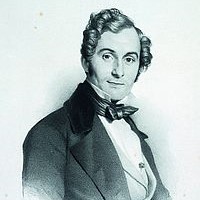Albert Lortzing (23.10.1801–21.01.1851)
Gustav Albert Lortzing was a composer, conductor, actor and singer. At Leipzig’s municipal theatre he worked as an actor and singer, and held the position of Kapellmeister (music director) in 1844/45 and 1849/50.

1. Biography
Gustav Albert Lortzing was born on October 23rd, 1801 in Berlin as the son of former leather merchant Johann Gottlieb Lortzing and his wife Charlotte Sophie, née Seidel. Young Albert Lortzing was trained in Berlin by composer, music teacher and later also director of the Berliner Sing-Akademie (Berlin singing academy) Carl Friedrich Rungenhagen. Since the family’s leather business was not very successful, the Lortzings decided to make their acting hobby a profession. They vacated their shop and became members of the Urania theatre company, where in 1806 Albert started to take on child roles. With his parents he travelled as a child actor through many German provinces from an early age and led an unsettled vagrant life. To help his family survive, young Lortzing also temporarily worked as a music copyist. He was self-taught in music and acting; his training was the theatre.
In 1826 Lortzing, who was married by now, left his parents to work with his wife at the court theatre (Hoftheater) in Detmold. This led to travels to Osnabrück and Münster. He reunited with his parents in Leipzig in 1833, where he stayed with his family for 12 years and worked at the municipal theatre. After he was deposed of his position as music director in Leipzig in 1844, Lortzing travelled with his family to Vienna, where he took up work as music director at the “Theater an der Wien” under director Franz Pokorny between 1845 and 1847. In 1850 he also lost this job and travelled back to his native city of Berlin with a short stopover in Leipzig. He stayed in Berlin until his death on January 21st, 1851.
2. Private Life
Albert Lortzing met young actress Rosina Regina Ahles in the ensemble of Josef Derossi, which the family had joined in 1817. The two actors married on January 30th, 1824 and had 11 children, of which only six lived to adulthood. The whole family moved to Detmold in 1826. During their stay there, from 1826 to 1833, Lortzing started to compose. After losing his employment as a music director in Leipzig in 1848 and then again in Vienna, he had to accept work as an actor again and as a guest conductor in Gera and Lüneburg to be able to feed his large family.
Heavily in debt, over-worked and critically ill, Lortzing died in Berlin, where he was buried in the 2nd St. Sophia Cemetery (II. Sophien-Friedhof). Members of the Brunswick Ducal Court Theatre (Braunschweiger Herzogliches Hoftheater) raised a monument on his honorary gravesite.
3. Connection to Leipzig
Working in Leipzig
On November 3rd, 1833 Gustav Albert Lortzing performed for the first time at Leipzig’s municipal theatre. Here he also reunited with his parents, who had been members of the ensemble of Friedrich Sebald Ringelhardt since 1832. In this ensemble Lortzing was very well liked and shone especially with his roles as nature-boy or young lover. He had a bubbly temperament and humour on stage. The first comic operas he composed did not fare well with censorship in Leipzig. Repeatedly he came into conflict with the “theatre police”. But with the premiere of Die beiden Schützen, his first Spieloper, on February 20th, 1837 he managed his breakthrough as an opera composer. Encouraged by this success he composed the opera Zar und Zimmermann in the same year, which then premiered on December 22nd. Only three years after its premiere the opera already had been performed in 18 theatres. Lortzing was able to achieve a similar success with his opera Der Wildschütz which also premiered in Leipzig on December 31st, 1842.
In 1844 he obtained a position as music director in Leipzig’s municipal theatre, but had lost it by the following year. The reason given was his health and the appearance of rheumatic afflictions. But even though the audience and ensemble protested, Lortzing’s dismissal as music director could not be changed. Before he left Leipzig and moved to Vienna, he lived on his savings in the city.
Social Life
In Leipzig Lortzing tried to integrate into social life and became a member of the “Tunnel über der Pleisse” social club. Every Sunday the club met in a pub called “Zum Birnbaum” – located at Hainstrasse it was later renamed Hôtel de Pologne and enlarged to today’s size – where they debated with artists, merchants, scientists and publishers about current political and artistic topics. Among the members of the club founded by composer Heinrich Marschner and theatre critic Friedrich Gleich were publisher Anton Philipp Reclam, music supplies merchant and father of Clara Schumann Friedrich Wieck, and composer and choir director Carl Friedrich Zöllner. In 1834 Lortzing also became a member of the “Balduin zur Linde” Masonic lodge. By attending those societies, he met many figures of Leipzig’s cultural life, such as Robert Schumann and Felix Mendelssohn Bartholdy.
Domiciles in Leipzig
During his 12 years in Leipzig, Lortzing moved house several times within the city. His first residence was in the Naundörfchen settlement from 1833 to 1838, west of the old city centre of Leipzig. Today the settlement doesn’t exist anymore but one service street in the Waldstrassenviertel district is named after it.
In 1838 he moved with his family to Frankfurter Strasse 28, next to Grosse Funkenburg. Several buildings in Leipzig were given this name, but all of them were destroyed. The address where Lortzing used to live at that time is today at Jahnallee 6, which is at the border of Waldstrassenviertel.
When he was appointed music director in 1844, he moved behind the Funkenburg, where he lived in a summer house with a garden. Only one year later he was forced to give up this residence and to move to Vienna. In 1849 he came back to Leipzig for a short while and lived at Tauchaer Strasse 2 (today Rosa-Luxemburg-Strasse) before returning home to Berlin. Unfortunately, none of Lortzing’s residences in Leipzig could be preserved. But one street in Waldstrassenviertel northwest of the city centre is named after him.
4. Reception
Albert Lortzing is regarded as founder and main representative of the German Spieloper, a comic opera succeeding the Singspiel (light opera). Through his roles as young lover or nature-boy but also because of his high voice as a tenor he became a favourite with the audience when he was still young. His opera Zar und Zimmermann, in which he also performed as Peter the Great, made him famous all over Germany. But back then the theatres only payed a lump-sum for the stage rights and sheet music of his works. Therefore, he could not profit financially from the long-lasting success of his pieces.
5. Works
Operas:
1837: Die beiden Schützen, LoWV 35 (premiere in Leipzig on February 20th, 1837)
1837: Zar und Zimmermann, LoWV 38 (premiere in Leipzig on December 22nd, 1837)
1842: Der Wildschütz, LoWV 58 (premiere in Leipzig on December 31st, 1842)
Singspiele (light operas):
1823/4: Ali Pascha von Janina, LoWV 9, (premiere in Münster on February 1st, 1828, first printing in Leipzig by B. Senff)
Oratorio
1828: Die Himmelfahrt Jesus Christi, LoWV 15 (premiere in Münster on November 15th, 1828)
Audio Samples
Ouvertüre aus Zar und Zimmermann (1837) www.youtube.com/watch
Roberts Arie aus Ali, Pascha von Janina (1823/24) www.youtube.com/watch
Die Himmelfahrt Jesus Christi (1828) www.youtube.com/watch
6. Sources and Links
Lodemann, Jürgen: Lortzing. Leben und Werk des dichtenden, komponierenden und singenden Publikumslieblings, Familienvaters und komisch tragischen Spielopernweltmeisters aus Berlin, Steidl Publishing House 2000.
Photo
Albert Lortzing, Lithographie by Schlick, 1845




